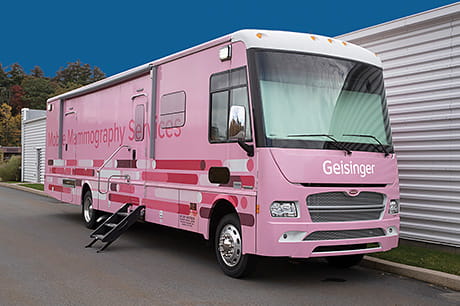How to ease your menopause symptoms
Tips for hot flashes, sleep troubles, weight gain — and a healthy sex life
Menopause has been the subject of a million jokes.
But the symptoms?
Not so funny when you actually have them.
Sure, menopause is a natural process — a milestone that some women celebrate. (No more periods!) But if you’re going through it now, you know it can also cause hot flashes and night sweats and reduce your sex drive. You might also put on a few extra, and stubborn, pounds.
Perimenopause vs. menopause: What’s the difference?
Most women develop symptoms, like irregular periods and hot flashes, a few years before their last period. This is called perimenopause. “Many women begin perimenopause sometime in their mid-40s, but some skip it and enter right into menopause,” explains Dr. Juan Manuel Arreguin, OBGYN at Geisinger.
During perimenopause, it’s common for your menstrual cycles to become irregular — your period may be late; you may skip one (or a few) and they may become heavier or lighter.
You might think your body’s telling you it’s getting late in life to have a baby. But don’t toss out your birth control yet. It’s still possible to get pregnant during perimenopause.
You don’t reach true menopause until you’ve gone 12 months without a period. Then you can set aside your contraceptives. Just be sure to wait that full year.
What are the symptoms of menopause?
Menopause symptoms can vary from woman to woman. But some common symptoms include:
- Hot flashes or night sweats
- Insomnia or difficulty sleeping
- Vaginal dryness and reduced sex drive
- Weight gain
- Mood changes, including anxiety and depression
- Urinary incontinence
Ways to ease the symptoms of menopause
If you’re experiencing mild or moderate symptoms, home remedies and lifestyle changes may do the trick. But if your symptoms are severe, you may need to see a doctor for treatment.
“For most women, medical treatment isn’t necessary for menopause,” says Dr. Arreguin. “But there are some things you can do at home to help combat the symptoms.”
Here are some of Dr. Arreguin’s tips:
Reduce hot flashes and night sweats
If you get hot flashes and night sweats (most women do), you can help ease them by:
- Establishing a calming nighttime routine, like daily meditation or breathing exercises, to reduce any stress from the day.
- Wearing loose, lightweight pajamas.
- Turning down your thermostat at night or using a bedside fan.
- Avoiding too much alcohol, caffeine and/or spicy foods. And if you smoke, this is a great time to quit.
- Getting a cooling blanket or mattress pad for your bed.
“Some women find relief when taking certain supplements, like black cohosh and evening primrose capsules or oils,” says Dr. Arreguin. “But these can interact with other medications, so be sure to talk to your doctor before taking any supplements.”
If your hot flashes and night sweats are severe, and keeping you from getting a good night’s rest, contact your doctor. “Hormone replacement therapy can be a great option for women experiencing severe menopause symptoms,” adds Dr. Arreguin.
Combat weight gain (and more) with diet and exercise
Our metabolism slows down as we age, and the loss of hormones during menopause can contribute to this. To help combat weight gain, focus on eating a healthy diet and moving your body.
Physical activity not only helps you lose and maintain a healthy weight, but it’s also a great stress reliever — helping to improve your mood, sleep and energy levels. “To get started, try taking a brisk walk every day for 20 to 30 minutes,” says Dr. Arreguin.
If you’re experiencing urinary incontinence, you may want to try Kegel exercises to strengthen your pelvic floor. Although, like most exercise programs, the effect may diminish over time. Be sure to contact your doctor if your symptoms don’t improve.
When it comes to your diet:
- Eat lean proteins, fruits, vegetables and whole grains.
- Limit added sugars, like those found in soft drinks, juices and baked goods.
- Stay hydrated with water.
- Drink less alcohol.
“You can also talk to your doctor to see if supplements may be right for you,” says Dr. Arreguin. “For example, calcium, vitamin D and magnesium supplements can also help protect your bones and improve your sleep.”
Make sex more comfortable
Menopause can cause vaginal dryness and loss of libido (or sex drive) — but it doesn’t have to put the brakes on your sex life.
“To make sex more comfortable, try using an over-the-counter lubricant and/or a vaginal moisturizer,” says Dr. Arreguin. “If your vaginal dryness is bothersome, you can talk to your doctor to see if topical estrogen is right for you.”
For the most part, menopause symptoms can be managed without medication. But you still need regular checkups and recommended health screenings. “If you’re experiencing any new or worsening symptoms, always reach out to your doctor for advice,” adds Dr. Arreguin.
Next steps:
Meet Juan Manuel Arreguin, MD
5 things women can do to stay well all year
Find a women’s health provider near you





